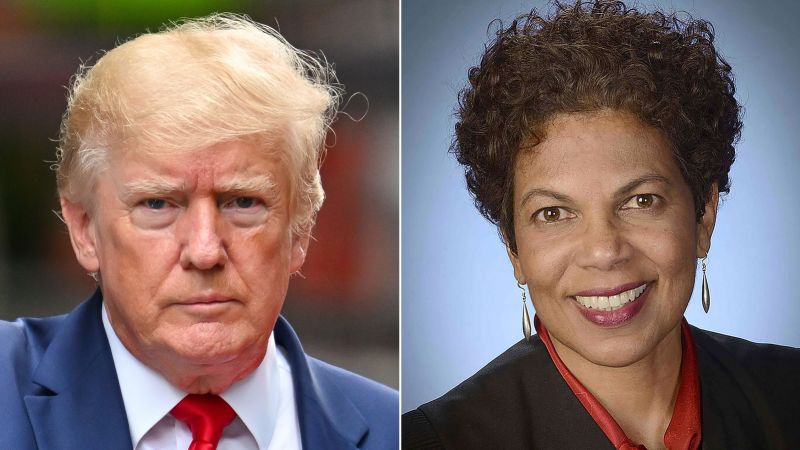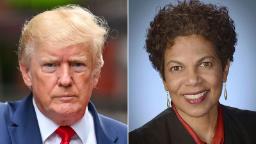CNN
—
US District Judge Tanya Chutkan set the tone for how she would preside over the election subversion against Donald Trump in a hearing Friday focused on what limits would be placed on how the former president can handle the evidence prosecutors will be turning over to him.
Chutkan kicked off the hearing – the first in the case before her and one that took place in her courtroom at DC federal court house – noting that while Trump’s rights as a criminal defendant would be protected, his First Amendment right to free speech was “not absolute.”
“In a criminal case such as this one, the defendant’s free speech is subject to the rules,” she said.
The judge closed the hearing with a promise that the case would advance like any normal proceeding in the criminal justice system, but warned that the more “inflammatory” statements were made by a party, the quicker she would need to move toward a trial to preserve a fair jury.
“It is a bedrock principle of the judicial process in this country,” she said, while quoting precedent, “that legal trials are not like elections, to be won through the use of the meeting hall, the radio and the newspaper.”
“This case is no exception,” she said.
Over the course of the proceedings, she expressed some skepticism to the arguments made by the office of special counsel Jack Smith, siding with Trump on at least a few matters related to the protective order over evidence that was the subject of Friday’s hearing. Addressing a submission from the government that she refused to let be filed under seal, she also emphasized a need for public transparency into the docket.
The hearing, roughly an hour and 40 minutes long, was the first in the case before Chutkan. She has already shown a habit of responding quickly and tersely on the docket to debates between the parties over scheduling. An Obama appointee and former public defender who has overseen several cases regarding the events of January 6, 2021, Chutkan has been outspoken about the harm the US Capitol attack caused to American democracy.
Chutkan later issued a protective order barring Trump from publicly disclosing sensitive information in the case.
Trump pleaded not guilty to four criminal charges related to his efforts to overturn the 2020 presidential election last week, and the judge cautioned lawyers for Trump, who did not attend the hearing, about any public statements by their client that could possibly intimidate of witnesses.
Whether or not Trump’s public statements are covered by the protective order that’s issued, she said, if they result in the intimidation of a witness or the obstruction of justice, “I will be scrutinizing them very carefully.”
Trump’s lawyer John Lauro said: “President Trump will scrupulously abide by his conditions of release.”
Later on, Chutkan said that “even ambiguous statement from either party or counsel … can threaten the process.”
Chutkan adopted restrictions proposed by prosecutors that would bar Trump from publicly disclosing information from interview transcripts and recordings from the investigation, including from witness interviews with investigators that took place outside of the grand jury. She also rejected Trump demands for broader language in the order that would allow people not directly employed on the defense team – including volunteers – to access discovery.
However, she agreed with Trump that the scope of evidence the restrictions would cover should be more limited than what prosecutors are proposing.
How Chutkan handles the case is likely to serve as a contrast to US District Judge Aileen Cannon, a Trump appointee in Florida who has been in less of a rush to move proceedings along in the classified documents case against the former president. Cannon has already been heavily scrutinized for what critics say is a favorable treatment of the former president in a previous lawsuit Trump brought last year challenging aspects of the Justice Department’s investigation.
Chutkan and Lauro had several pointed exchanges about what the 2024 presidential contender should be allowed to say about the evidence that is turned over to him in the case.
“No one disagrees that any speech that intimidates a witness would be prohibited, what we are talking about is fair use of information,” Lauro said at one point, putting forward a hypothetical that Trump is publicly remarking on something from his personal memory that is also evidence in the case.
“The fact that he is running a political campaign currently has to yield to the administration of justice,” the judge said. “And if that means he can’t say exactly what he wants to say in a political speech, that is just how it’s going to have to be.”
Lauro put forward a hypothetical of Trump making a statement while debating his former Vice President Mike Pence – who is also running for the White House now and is a key witness in the criminal case – that overlapped with what’s in discovery.
The judge wasn’t sold.
“He is a criminal defendant. He is going to have constraints the same as any defendant. This case is going to proceed in a normal order,” Chutkan said.
“You are conflating what your client needs to do to defend himself and what he wants to do politically,” she told him. “And what your client does to defend himself has to happen in this courtroom, not on the internet.”
The special counsel said in Thursday court filings it wants the trial to begin on January 2, 2024, a date that Trump rejected in a social media post.
This story has been updated with additional developments.

